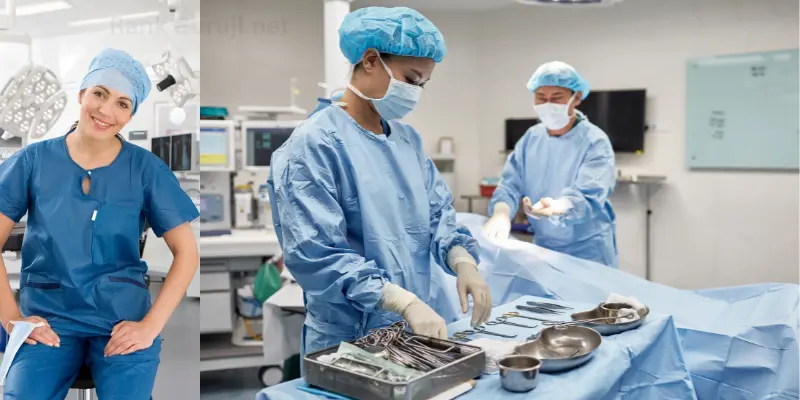Surgical tech jobs are becoming one of the most important and in-demand careers in the healthcare field. These jobs are perfect for people who want to help save lives, work closely with doctors, and be part of real surgeries without becoming a doctor themselves. A surgical tech, also called a surgical technologist, plays a key role before, during, and after an operation.
Daily Duties Of A Surgical Tech
Surgical tech jobs involve many important tasks every single day. A surgical tech helps doctors and nurses in the operating room. Their work starts before surgery, continues during surgery, and ends after surgery. Let’s look at their daily duties step by step.

1. Before Surgery
- Prepare the Operating Room: A surgical tech makes sure everything is clean and ready. They set up surgical tools, machines, and sterile drapes.
- Check Supplies: They count the tools and supplies to make sure nothing is missing.
- Help with Patient Prep: They may help shave or clean the surgery area and assist in moving the patient to the table.
- Wear Proper Gear: They wear gowns, gloves, and masks to keep everything sterile.
2. During Surgery
- Pass Tools to the Surgeon: When the surgery starts, the surgical tech hands the right tools to the surgeon at the right time.
- Keep the Area Sterile: They make sure the surgery area stays clean and free from germs.
- Monitor Equipment: They may check machines like lights or suction and make sure everything works properly.
- Support the Team: They work closely with doctors and nurses, always ready to help quickly.
3. After Surgery
- Clean the Operating Room: After the surgery is finished, the tech helps clean up everything safely.
- Count Tools Again: They count all the tools again to make sure nothing is left inside the patient.
- Move the Patient: They help move the patient from the operating room to the recovery area.
- Get Ready for the Next Surgery: They clean and set up everything again for the next procedure.
Skills and Qualities Needed
To succeed in surgical tech jobs, you don’t just need a certificate you need the right skills and a strong mindset. Surgical technologists work in high-pressure environments like operating rooms, so they must be calm, focused, and prepared at all times. Let’s explore what qualities are most important for this career.
- Attention to Detail
- Good Communication Skills
- Physical Stamina
- Teamwork
- Quick Thinking
- Organizational Skills
- Calm Under Pressure
- Manual Dexterity
- Compassion and Care
Educational Pathway Of Surgical Tech Jobs
To get started in surgical tech jobs, you need more than just passion you need the right education and training. But don’t worry, becoming a surgical tech is faster than becoming a doctor or nurse. Here’s a step-by-step look at the educational path you need to follow.
- Earn a High School Diploma or GED
- Enroll in an Accredited Surgical Technology Program
- Complete Clinical Training
- Get Certified (Optional, but Highly Recommended)
- State Licensing (If Required)
- Continuing Education
Job Outlook and Opportunities of Surgical Tech Jobs
Surgical tech jobs have a bright future because hospitals and clinics always need skilled professionals to help during surgeries. With advances in medical technology and an increasing number of surgeries every year, the demand for surgical technologists is growing fast.
1. Growing Job Demand
The U.S. Bureau of Labor Statistics predicts that the demand for surgical techs will grow about 7% from 2022 to 2032 faster than many other jobs. This means more hospitals and surgery centers are hiring surgical techs every year.
2. Workplaces for Surgical Techs
You can find surgical tech jobs in many places, such as:
- Hospitals (largest employer)
- Outpatient surgery centers
- Doctor’s offices
- Specialized clinics (cardiology, orthopedics, etc.)
- Military and government health facilities
3. Types of Surgeries and Specialties
As a surgical tech, you can work in different areas like:
- General surgery
- Orthopedic surgery (bones and muscles)
- Cardiovascular surgery (heart and blood vessels)
- Neurosurgery (brain and nerves)
- Plastic surgery
Specializing in one area can increase your job opportunities and pay.
4. Opportunities for Advancement
With experience and extra training, surgical techs can grow their careers by:
- Becoming surgical assistants
- Moving into management roles (operating room supervisor)
- Teaching new surgical techs
- Working in medical sales or product training
Career Advancement Paths Of Surgical Tech Jobs
Starting a job as a surgical technologist is just the beginning. Surgical tech jobs offer many ways to grow and take on new challenges. If you want to build a long-lasting and successful career, there are several paths you can follow to advance.

- Specialize in a Surgical Area
- Become a Surgical First Assistant
- Move Into Leadership and Management
- Work in Education and Training
- Explore Medical Sales and Product Training
Advantages and Disadvantages of Surgical Tech Jobs
Every job has its good and bad sides. Before starting surgical tech jobs, it’s important to understand both the advantages and disadvantages. This will help you decide if this career is the right fit for you.
| Pros |
| High Demand and Job Security: Hospitals always need surgical techs. The demand is growing, so you will likely have steady work and job security. |
| Good Salary: Surgical techs earn a decent salary, and with experience or specialization, you can make even more. |
| Work in a Team Environment: You get to work with doctors, nurses, and other health professionals in a team. |
| Helping People: You play a direct role in helping patients during surgery. It feels good to know your work saves lives. |
| Short Education Time: Compared to doctors or nurses, becoming a surgical tech takes less time usually 1 to 2 years of training. |
| Variety of Workplaces: You can work in hospitals, outpatient centres, clinics, or even government facilities. |
| Cons |
| Exposure to Health Risks: There is a risk of exposure to blood, body fluids, and infections, so safety precautions are very important. |
| Physically Demanding: You spend long hours standing and moving in the operating room, which can be tiring. |
| Stressful Situations: Surgery can be stressful, especially during emergencies. You must stay calm and focused. |
| Limited Career Growth Without Extra Training: To advance beyond surgical tech, you often need additional education or certifications. |
| Irregular Hours: Sometimes you may need to work nights, weekends, or be on call during emergencies. |
FAQs About Surgical Tech Jobs
If you’re thinking about a career in surgical tech jobs, you probably have many questions. Here are some of the most common FAQs with simple and clear answers.
What does a surgical tech do?
A surgical tech prepares the operating room, helps surgeons during surgery by passing tools, keeps everything sterile, and assists after surgery. They make sure surgeries run safely and smoothly.
How long does it take to become a surgical tech?
It usually takes 9 months to 2 years to complete a surgical tech training program. This depends on whether you choose a certificate, diploma, or associate degree.
Do surgical techs need certification?
Certification is not required in every state but is highly recommended. Certified surgical techs have better job chances and can earn higher salaries.
What skills are important for surgical tech jobs?
Attention to detail, good communication, physical stamina, teamwork, quick thinking, and staying calm under pressure are key skills.
Where do surgical techs work?
Most surgical techs work in hospitals, outpatient surgery centres, clinics, or government health facilities.
What is the average salary for a surgical tech?
The average salary varies by location and experience but generally ranges from $45,000 to $60,000 per year in the U.S.
Is the job physically demanding?
Yes, surgical techs spend long hours standing and moving in the operating room. Physical fitness helps to manage this.
Can surgical techs specialize in certain types of surgery?
Yes, surgical techs can specialize in areas like cardiovascular, orthopedic, or neurosurgery, which can improve job opportunities and pay.
What are the chances of career growth?
There are good chances for advancement by gaining experience, additional certifications, or moving into roles like surgical assistant, supervisor, or instructor.
Is this career stressful?
Surgical tech jobs can be stressful because of the high-pressure environment, but many find it rewarding and exciting.
Conclusion
Surgical tech jobs are vital to modern healthcare, offering a fast-paced, rewarding career with strong demand, good pay, and growth potential. As key members of the surgical team, surgical technologists play a crucial role in saving lives and ensuring patient safety.
Article by Rank Guruji



